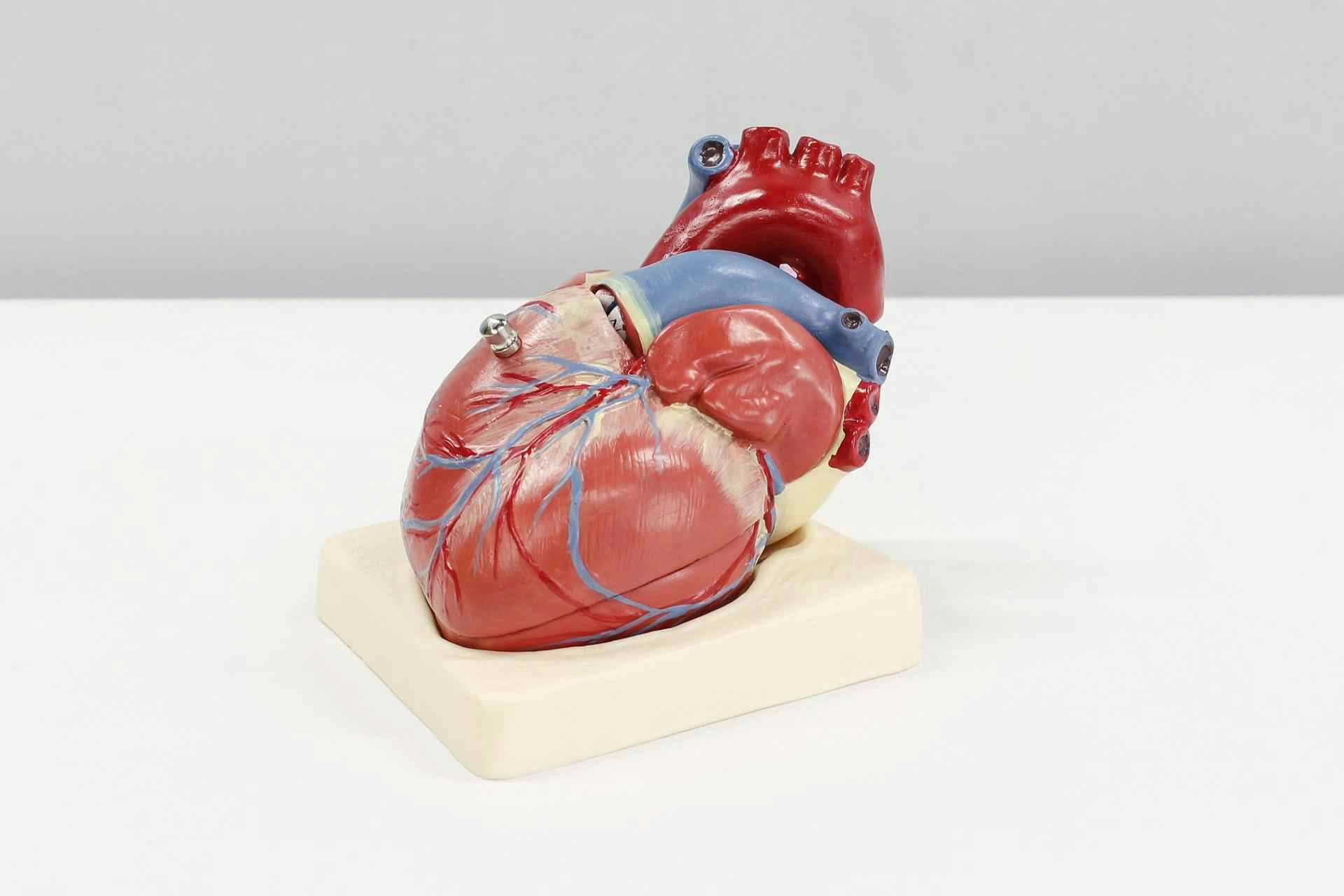The British Heart Foundation suggests that in the United Kingdom, a person dies every 3 minutes due to cardiovascular disease. Elsewhere, the American Heart Association lays bare the scale of the problem in the United States, highlighting the global impact of heart disease.
Cardiovascular disease has a very high burden on individuals, communities, and society. So what can we do about it? Thankfully, most risk factors leading to cardiovascular disease are preventable or reversible. Read on to learn what you can do to keep your heart healthy.
What is heart disease?
The term "Heart Disease" refers to several heart conditions. The most common heart disease is coronary artery disease, during which some or one of the blood vessels that supply the heart become partially blocked.
Plaque starts to build up when vessels are damaged or under stress. This can result from things like high blood pressure, high blood sugar levels (diabetes), and high cholesterol. When a vessel becomes blocked, the total blood supply for a particular tissue or muscle can be diminished. This, in turn, leads to a heart attack. Heart attacks can be severe and sudden (you may collapse) or slow and progressive (causing chest pain over a day).
Heart disease has proved to be a significant burden amongst the UK population, primarily due to its "silent-but-deadly" nature. Most patients may not exhibit symptoms until they experience a heart attack, heart failure, or an abnormal heart rate.
So how can we prevent the effects of heart disease if we don't know we have it?
The necessity of regular screening
Having regular blood tests to track cholesterol levels, blood clotting factors, and blood sugar is an important and simple step to monitoring your risk of heart disease. During a cardiology workup, your doctor may also test your activity tolerance to assess how your heart works in response to exercise (cardiac stress test).
Regular screening is the most crucial factor in maintaining heart health. Unfortunately, due to the nature of heart disease, you usually won't feel symptoms until the heart is already under strain, by which stage significant damage may already be done.
Blood pressure
High blood pressure, or hypertension, can threaten your overall health. Hypertension is the most important modifiable risk factor for causes of mortality and morbidity worldwide. Yet, nearly half of those with hypertension are utterly unaware of their condition, given its lack of symptoms.
Hypertension can be easily managed using a combination of medications and lifestyle changes. Getting regular blood pressure checks from your local GP can help identify hypertension at earlier stages and trigger lifestyle changes as soon as possible.
Cholesterol
Cholesterol is not as bad as we think. It's an essential molecule made by our liver and used to build essentials like hormones and vitamins. We also get extra cholesterol from consuming animal products. There are 2 main types of cholesterol that we typically hear about. These are high-density lipoprotein (HDL) and low-density lipoprotein (LDL). LDL is generally referred to as the "bad cholesterol" and is most commonly associated with an increased risk of cardiovascular disease.
When cholesterol levels exceed the recommended amount, it can result in a buildup of plaque that our natural blood cells congregate around, leading to a decrease in blood flow. This, ultimately, can result in a heart attack.
High cholesterol bears no symptoms. Therefore, it is essential to carry out regular blood cholesterol tests to check and maintain our cholesterol levels. High cholesterol can be managed using medications and by implementing healthier lifestyle choices.
Blood sugar
Obesity and type 2 diabetes are major risk factors for developing cardiovascular disease. Diabetes can potentially increase the risk of developing heart failure and hypertension. Additionally, studies have found certain mechanisms associated with diabetes independently increase the risk of cardiovascular disease in diabetic patients, thus accentuating the necessity of regular blood sugar monitoring.
Regular blood sugar monitoring, especially if you are taking insulin, is the most crucial aspect of managing diabetes. Diabetes can often be managed using a combination of medication and a healthy lifestyle.
How to maintain a healthy heart
Enough solid evidence exists offering fundamental strategies for maintaining a healthy heart. Most risk factors associated with the development of cardiovascular disease are often preventable and include:
- Following an unhealthy diet
- Having a sedentary lifestyle
- Smoking
While these are the top three, there are many more. So let's take a look at the steps we can take to help improve our cardiovascular health.
Heart Healthy Diet
Multiple studies have confirmed the connection between diet and heart disease. Unfortunately, although the research has been revealing, it has led to much confusion and misconception regarding the best diets for keeping your heart healthy.
The National Institute for Health and Care Excellence (NICE) guidance suggests the best diets for the prevention of heart disease include large amounts of fruits, vegetables, whole grains, nuts, fish, and poultry. In addition, research shows that we should reduce consumption of red and processed meats, refined carbohydrates, sugary snacks, and foods with a large concentration of trans fats.
Specific dietary changes to help you eat more healthy foods and healthy fats include:
- Introducing wholegrain cereal to your diet (1-4 times per week)
- Introducing a fish or vegetable-only meal 1-3 times per week
- Increasing your Omega 3 intake, which you can do by eating more fish or nuts
These strategies can help reduce blood pressure and body fat, improve mood, and decrease cholesterol levels. People with a diet consistent with the above reduced their risk of:
- Developing heart disease by 31%
- Developing diabetes by 33%
- Stroke by 20%
Furthermore, sodium and potassium - two interrelated minerals - play significant roles in regulating blood pressure. Therefore, reducing our intake of salty foods and increasing potassium-rich foods into our diet can significantly lower our risk of developing heart disease.
Sian Porter, Consultant Dietician to California Walnuts, told Health Times: “Research shows walnuts may have a beneficial effect on heart health. Walnuts are the only tree nut to contain a rich source of omega-3 alpha-linolenic acid (ALA), an essential fatty acid which cannot be made in our body and a vital nutrient which we must make sure we get enough of through diet to maintain health.
"Research reviewed by EFSA leading to an approved health claim has shown ALA contributes to the maintenance of normal blood cholesterol levels. The EU has also approved the health claim that a handful (30g) of walnuts a day can have a positive effect on the elasticity of the blood vessels and can thus help keep the cardiovascular system healthy.
"In addition, a 2020 epidemiological (population) study linked eating just half a serving a day of nuts, such as walnuts, with a decreased risk of cardiovascular disease (CVD) which includes coronary heart disease and stroke. California Walnuts have also received the heart-healthy seal of approval from the charity Heart UK.”
Exercise
Your heart is a muscle, like any other muscle in the body. The more you use it, the stronger it becomes. Physical activity is an easy and cost-effective way to decrease your risk of heart disease. Unfortunately for most, our exercise and activity levels tend to decrease as we age. Physical inactivity has been shown to increase the risk of developing heart disease by 1.5 times.
Walking for 30 minutes per day, 5 days per week, can reduce stress, blood sugar, body fat, and blood pressure.
Weight loss for someone who is used to a sedentary lifestyle should be approached slowly, and exercise levels should be built on over time. You don't need marathon training to see results, either. You can significantly benefit your cardiovascular health by simply implementing light exercises into your daily routine.
Quitting smoking
Smoking can increase the risk of heart disease by 50% over ten years.
One of the best things you can do for your health is avoid tobacco in all forms. Tobacco isn't just a financial burden. It has been proven to slow you down, make you sick, and shorten your life.
Although some find relief from stress in their smoking habit, it only increases the strain on your body. This is because your body has to work hard to detoxify itself from ingredients in tobacco, thus preventing it from focusing on performing other functions such as collagen production.
Quitting smoking can be challenging. The process can be different for everyone. Some choose to go cold turkey, whereas others rely on medications and smoking cessation tools. However, if you are ready to quit smoking, there is no shortage of organisations, support groups, and programs available for those who want to stop. Contact your local pharmacy or medical practice to work out a personalised treatment plan suited to you for more information.
Weight loss
Excess weight can drastically impact your risk of developing cardiovascular disease. One study that included over 1 million women proved that Body Mass Index (BMI) was one of the most important modifiable risk factors for the development of cardiovascular disease.
Maintaining a healthy BMI can drastically reduce your risk of heart disease as well as a host of other conditions. If you are unsure how to measure your BMI, check out the NHS guidelines here.
Sleep
Sleep can help reduce blood pressure. Adults are recommended to have 7-9 hours of sleep every night. A lack of sleep can also increase stress and affect our mood, relationships, and appetite. If you struggle to get enough sleep, these ideas may come in handy:
- Sleep in a dark, quiet room
- Avoid using electronics in the two hours before bedtime
- If you do use technology, use a blue-light filter
- Avoid exercise before sleep
Healthy living for a healthier future
A healthy heart is central to overall good health. Investing in your heart is not only physically rewarding but can help drastically reduce your risk of heart disease and lower your risk of heart attack and stroke.
It's never too late to start taking care of your heart. By eating healthier, taking those extra daily steps, and stopping smoking, you can make a significant difference.






